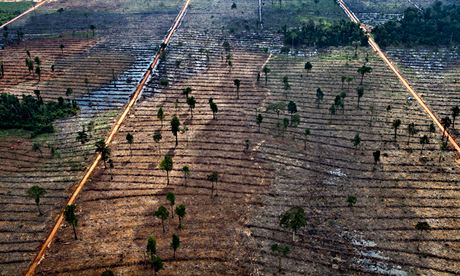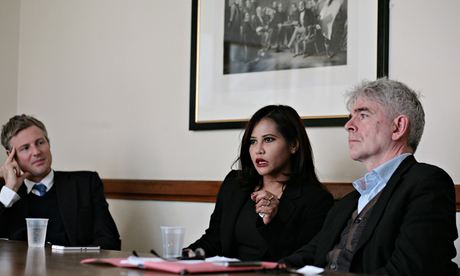Is APP's zero deforestation pledge a green villain's dramatic turnaround?

When Ken dumped his long-term girlfriend Barbie via giant Greenpeace poster on the Mattel toy company HQ in Los Angeles in 2011, he said: "Barbie: It's over. I don't date girls that are into deforestation."
Mattel was one of over 130 global companies that bought paper packaging from the world's biggest pulp and paper company, Asia Pulp and Paper (APP), all of whom ended their relationships with the Indonesian giant because of concerns over its deforestation of rainforest.
The company's packaging had been everywhere: Kraft, Unilever, Tesco, Disney, Danone, Mcdonalds and many more were customers. But the aggressive Greenpeace campaign labelled APP the world's worst destroyer of pristine forest, driving up carbon emissions and pushing tigers and orangutans to the brink. Faced with an existential threat, the secretive family-run company caved in and annouced a "zero deforestation" policy and now, one year on, it has won back its first order, from stationery giant Staples.
It is, according to environmentalist and MP Zac Goldsmith, the most dramatic turnaround of any global green villain ever seen and an encouraging sign that huge environmental challenges can be tackled. "This is one of the big issues: if you are interested in climate change, biodiversity, deforestation, then Indonesia is probably the most important country in the world," says Goldsmith, who has seen the destruction on the ground. But he said APP's new pledge, which followed many years of greenwashing, places as much pressure on the green campaign groups that have endorsed the move as on the company itself.
"APP haven't got any more chances: if it screws up, that is it for them, no-one will ever believe them again," he said. "But the pressure on Greenpeace is also immense: they have spent years building up extraordinary credibility and it is on the line."
The two key protagonists, APP managing director for sustainability Aida Greenbury and Greenpeace executive director John Sauven – once fierce enemies – are now able to sit side-by-side for a Guardian interview and tease each other. "You got me deported from Indonesia as a threat to national security," says Sauven, who now calls APP's turnaround a "seismic shift". "You stole my phone," Greenbury fires back, and both charges are partly true.
 Head of Greenpeace UK John Sauven (right), APP managing director Aida Greenbury (centre) and MP Zac Goldsmith at a meeting in Westminster, London. Photograph: Martin Godwin
Head of Greenpeace UK John Sauven (right), APP managing director Aida Greenbury (centre) and MP Zac Goldsmith at a meeting in Westminster, London. Photograph: Martin Godwin "When Greenpeace campaigned, it was really, really harsh for us," says Greenbury. "We are the largest pulp and paper manufacturer in the world right now and we want to expand to other markets as well. We couldn't have this rubbish hanging around our neck, to be known as the forest destoyer. We had to adopt a much higher standard." She says Greenpeace, which has suspended its public campaign, has not stopped pressuring APP. "They just have shifted their campaigning from the Mattel building and moved it inside into the company board room," she says.
APP openly admits it has breached its zero deforestation pledge three times in the year since it was made. One breach resulted from the overlap of another company's licence with one of APPs, a common problem in Indonesia. The second came from a pre-existing local community development program mandated under Indonesian law. "The third one was a basically a mistake in our own procedures that we self-disclosed and we have promised to restore it," says Greenbury. "Our forest conservation plan has been a lot harder than we thought it would be."
The critical test will come later this year, when the respected NGO Rainforest Alliance (RA), invited in by APP, will give its assessment of whether APP is delivering on its promises on the ground. The RA abandoned a previous agreement with APP in 2007, after the company reneged on earlier deforestation pledges. But Richard Donovan, the RA's vice president of forestry, says: "We wouldn't put our reputation on the line if we didn't think APP was serious this time around."
APP's volte face also raises the question of when businesses should re-engage with supplier companies promising to reform. Tony Juniper, former director of Friends of the Earth, is now working with APP to implement its new sustainability policies. "For the last 30 years we've seen progress from companies by punishing the bad ones," he says. "But I think we're now into a new phase. It seems logical to me that in order to accelerate the change we need to be rewarding the good ones as well as punishing the bad ones."
Mark Buckley, vice president of environmental affairs at Staples, agrees: "The decision to re-engage with APP was made after a careful review of APP's sustainability commitments and detailed conversations over many months with a variety of stakeholders. APP senior leadership clearly understands that a long term commitment to more sustainable practices is essential for them to succeed as a business. We will be actively monitoring APP's progress."
 A Greenpeace banner in Piccadilly Circus shows the picture of the male doll Ken saying: 'Barbie, You're dumped. Girls that threaten furry animals make me sick.' The banner was in response to revelations that the packaging for Mattel's Barbie doll is produced using pulp from the rainforests of Indonesia, home to endangered species such as the Sumatran tiger. Photograph: John Cobb/Greenpeace
A Greenpeace banner in Piccadilly Circus shows the picture of the male doll Ken saying: 'Barbie, You're dumped. Girls that threaten furry animals make me sick.' The banner was in response to revelations that the packaging for Mattel's Barbie doll is produced using pulp from the rainforests of Indonesia, home to endangered species such as the Sumatran tiger. Photograph: John Cobb/Greenpeace However, some campaigners remain sceptical. "Given APP's track record of broken commitments and the fact it has yet to get independent verification that their forest conservation plans are actually working, Staples is jumping the gun," said Lafcadio Cortesi, Asia director at Rainforest Action Network. "Our experience suggests that companies are more motivated to undertake robust implementation of commitments if rewards come after, not before, it is carried out and independently verified."
For APP's Greenbury, the next major challenge is to get their competitors to invest in similarly strict – and costly – policies. Sauven is dismissive of a sustainability pledge made recently by another Indonesian forestry giant, APRIL. "Their statement is nonsense – it means six more years of deforestation. APP turned the keys off on the bulldozers the day they made their pledge."
For Greenpeace, they are now taking on another another giant multinational with products in every home – Procter & Gamble – over its alleged use of unsustainable palm oil linked to deforestation.
| Reply via web post | Reply to sender | Reply to group | Start a New Topic | Messages in this topic (1) |
to Subscribe via email :
batavia-news-subscribe@yahoogroups.com
----------------------------------------
VISIT Batavia News Blog
http://batavia-news-networks.blogspot.com/
----------------------------
You could be Earning Instant Cash Deposits
in the Next 30 Minutes
No harm to try - Please Click
http://tinyurl.com/bimagroup
--------------
No comments:
Post a Comment